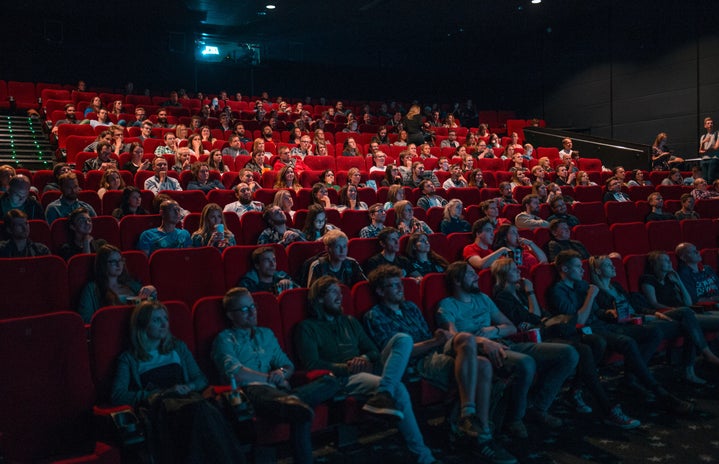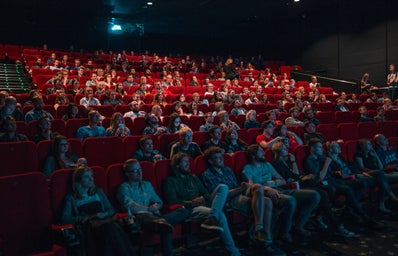Picture this: it’s March 2012 and you just entered a movie theater lobby. The scent of overpriced popcorn fills the air as you step in a long, winding line to buy your ticket. As you enter the theater you search for good seats and pray for a good time. What movie could possibly bring you this much anticipation? …The Hunger Games of course!
10 years ago we first held our breath and hoped that The Hunger Games film adaptation would live up to the Suzanne Collins Novel. Thankfully the film, which stars Jennifer Lawrence as Katniss Everdeen and Josh Hutcherson as Peeta Mellark, was well received.
It’s now been a decade since the film’s release, people are still talking about The Hunger Games. Whether it’s through comparing it to other pieces of media or talking about its societal commentary, it’s clear that conversations surrounding the trilogy are not going away any time soon. Some even claim that the books and their film adaptations revolutionized the YA dystopian genre.
I read The Hunger Games trilogy for the first time around age 10 and yes, I was way too young to fully understand what was going on (hell, I was still at the point where I thought 16-year-olds were full-grown adults). But for some reason, the premise was so incredibly intriguing to me. I was hooked from the very first chapter and remained hooked for several years. Hooked to the point where I was obsessing over millennial-core memes on Pinterest and watching cast interviews for hours on end. I probably sound like some sort of crazy, internet fan-girl, and that’s because I was. But I was far from being the only one. So…what is it about The Hunger Games that has allowed it to reach so many people and stay pop-culture relevant for so long?
A Protagonist Worth Fighting For
Sure. As my parents often remind me, it’s important to respect your elders. With book series such as Harry Potter and Twilight in the mix, it would be crazy to say that The Hunger Games was the first YA series to amass a huge following. However, when readers first opened Suzanne Collins’ 2008 they found something new, or new-ish at least: a female protagonist who would take control over her own narrative. Katniss Everdeen is a 16-year-old girl. She’s strong, intelligent, and flawed. The books and films do not shy away from exploring all of these facets including her familial loyalty and mental health struggles. With Katniss, readers were presented with a person that young people could look up to. Yes, the series includes multiple love interests for Katniss but does not let them define who she is. Above all, she feels real and well-rounded— qualities that translate well onto Jennifer Lawrence’s film portrayal.
An Amazing Adaptation
Not only is The Hunger Games movie entertaining, but it helped set the standard for what a good book-to-movie adaptation could be. First, I’d like to take a moment to obsess over the casting. As a lover of the books, I can confidently say each role was incredibly cast. Just look at Elizabeth Banks as Effie Trinket and Stanley Tucci as Caesar Flickerman— both are iconic characters portrayed beyond perfectly. All of the capitol members feel this way— eccentrically upbeat in a way that borders on terrifying.
While there are some changes from the book, the film does an amazing job of bringing this story to life. Some of the changes even serve to strengthen and flesh out an otherwise narrow story. On paper, seeing the story from inside of Katniss’ head creates a really strong narrative. It makes scenes such as Rue’s death and the game’s final moments even more emotional and poignant. However, the film version allows viewers to become omniscient onlookers that can spy on the contestants, game-makers, civilians, and capitol members. By taking us outside of the arena, the nationwide impact of the games is amplified. Rue’s death, for example, is broadcasted throughout the districts. We, as viewers, can see how her home district reacted instead of just reading about Katniss’ tears. This visual of district 11’s riot helps further the plot by laying the groundwork for the revolution that takes place in later films. Bridging these gaps helps the films flow in a way the books just couldn’t.
Creating Real Change
There’s no doubt that The Hunger Games has some socio-political commentary. From commenting on capitalism to showing the harmful effects of a media-crazed society, The Hunger Games brings important social issues to light. One good example of this is the inclusion of ‘Career Tributes.’ This title refers to tributes from the wealthier districts that train for the games from infancy. Winning the games ups one’s social status even more, so these ‘Career Tributes’ often volunteer. This detail is just one in the series that can represent American capitalism. Life is substantially easier for those who have access to good nutrition, training facilities, healthcare, and nice places to live. Those that happen to be born in poorer districts tend to be out of luck.
This dystopian-series-with-political-undertones setup quickly inspired other book series such as Divergent, The Maze Runner, and The 5th Wave— just to name a few. Again The Hunger Games was not the first book to have these elements (The Giver and 1984 come to mind), but Collins’s novel helped bring these social issues to a younger, more contemporary audience.
All of this is great in theory, but it’s even more impactful to note that The Hunger Games has inspired real social change. When the film first premiered, it formed an official partnership with Feeding America, a hunger-fighting charity. The partnership aimed to raise awareness about food insecurity and hunger in America. Other activism initiatives followed as the subsequent films in the series were released. In Myanmar, for example, protestors adopted the film’s three-finger salute to show opposition to a military coup as recent as 2021.
A Far-Reaching Fandom
With the success of the novel, The Hunger Games had a big fandom before its film adaptation was even released. The film grossed over 150 million dollars on opening weekend alone. However, the film allowed this important story to be told to a bigger audience; parents that were dragged along with their children, non-readers, and people just looking for a movie to go see.
And after the film was released— the fandom exploded. Fanpages popped up left and right, Gale vs. Peeta arguments permeated the air, cast interviews racked up millions of views, etc. I still remember thinking their press panel at the Mall of America was the biggest deal ever.
While The Hunger Games did not start fandom culture, it definitely played a huge role in expanding it and keeping it going. Inside jokes were crafted through Twitter interactions, cosplayers often sported district 12 garb, the cast was idolized and followed to different events, and very strange merch was sold on the internet. I remember being devastated that I couldn’t figure out how to put my hair into a ‘Katniss braid.’
While re-reading the previous paragraph I had horrifying flashbacks to another piece of The Hunger Games’ fan-fare: oddly high-budget youtube parodies. Parodies, such as this 2012 youtube video, often had musical components for some reason and were strangely popular in the early 2010s YouTube world. While I’m embarrassed to admit that I definitely consumed this type of content as a child, I think these weird trends show just how popular The Hunger Games was. I guess what I’m trying to say is: once your franchise becomes an extremely niche trend on social media, you know you’ve made it.
With TikTok audios, ongoing exhibits, and a recent prequel, The Hunger Games has remained a big part of pop-culture history— even in 2022.
Happy Hunger Games….






